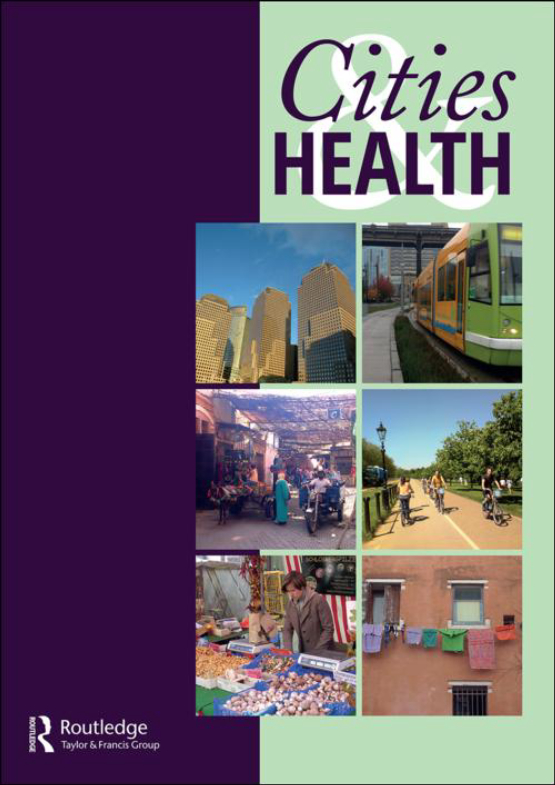Submit a Manuscript to the Journal
Cities & Health
For a Special Issue on
Walkability & Mobility Justice: Planning for walkable, equitable & healthy communities across continents, countries & cultures
Manuscript deadline
31 October 2024

Special Issue Editor(s)
Annika Lundkvist (Lead Guest Editor),
Pedestrian Space / Institute of Geography & Spatial Organization, Poland
[email protected]
Alshimaa Aboelmakarem Farag (Guest Editor & Special Issue Adviser),
Zagazig University, Egypt
[email protected]
Daniel Oviedo (Guest Editor & Special Issue Adviser),
University College London
[email protected]
Ansila Thomas (Guest Editor),
Socratus Foundation for Collective Wisdom
[email protected]
Yetimoni Kpeebi (Guest Editor),
Missouri State University, USA
[email protected]
Mateusz Różański (Guest Editor),
Johns Hopkins University, 21st Century Initiative
[email protected]
Walkability & Mobility Justice: Planning for walkable, equitable & healthy communities across continents, countries & cultures
Full List of Guest Editors
Annika Lundkvist (Lead Guest Editor)
Pedestrian Space / Institute of Geography & Spatial Organization, Poland
Alshimaa Aboelmakarem Farag (Guest Editor & Special Issue Adviser)
Zagazig University, Egypt
Daniel Oviedo (Guest Editor & Special Issue Adviser)
University College London
Sam Barr (Guest Editor)
Global Infrastructure Hub, Australia
Yetimoni Kpeebi (Guest Editor)
Missouri State University, USA
Mateusz Różański (Guest Editor)
Johns Hopkins University, 21st Century Initiative
Ansila Thomas (Guest Editor)
Socratus Foundation for Collective Wisdom
Maria Katticaran (Guest Editor)
HDR, USA
Apoorva Nandish (Guest Editor)
Safetipin, India
Chetan Sodaye (Guest Editor)
WRI, India


This special issue, ‘Walkability and Mobility Justice: Planning for walkable, equitable & healthy communities across continents, countries & cultures’, is initiated by Pedestrian Space in collaboration with The Schumacher Institute with the aim of bringing a diverse lens of awareness to the various challenges of addressing walkability concerns across cultures and continents.
Read more about the call and the global guest editorial team for this special issue here.
The special issue will investigate the prioritisation of the development of walkable communities as a critical urban health issue, connecting to themes such as spatial equity, environmental protection, urban resilience, sustainability, human mental and physical health, and social resilience.
We welcome submissions from scholars and practitioners across the globe who consider walkability as they research urban issues, test practical applications at the city or neighbourhood scale, or can offer case studies of good practice. We are interested in examining barriers to, and overcoming aspects of, mobility justice to enhance walkability for urban health.
Thematic challenges and key questions
Evidence is clear that enhancing walkability in communities can offer numerous benefits, countering a dominant logic of car-centric development. More walkable neighbourhoods offer many positive outcomes, including improved physical and mental health, benefits for environmental sustainability, fostering social interaction, supporting local economies and reducing multiple disbenefits of traffic congestion. What is lacking across cultures is a demonstrated will to act in order to address and resolve numerous and severe issues of mobility justice. While substantial research does exist, there is a disconnect between the data and will to act.
One focus for mobility justice is in creating and sustaining walkable neighbourhoods; a significant action for both health and health equity. Such action is relevant across many countries and cultures and has clear ramifications on policies and investment when considering transport infrastructure and the quality of pedestrian space and life and effect on social and environmental justice and health. The role of truly transdisciplinary research in shaping understanding on contemporary issues of mobility justice is vital as are grassroots actions and policies that support the planning and preservation of walkable communities.
This special issue will focus on three main strands:
Social and environmental justice and health in the context of walking
- How can we best address the underlying disparities in transportation access towards solutionary approaches for mobility justice?
- How can we ensure that marginalised communities are being equitably served by urban planning and policy decisions that affect local mobility?
- What are the relationships and impacts of various dimensions of identity (including sex, ethnicity, race and religion) on experiences of walking?
Transdisciplinary approaches to research and action
- What are the dominant critical discourses in policy and practice around walkability in research, policy and practice from a perspective of justice and health?
- Where can we find innovative approaches to participatory research on walking?
- Can we learn from experiences of transdisciplinary research on walking in different urban contexts?
Policy and grassroots actions to promote walkability and health equity
- To what extent have actions been successfully implemented to nudge behaviour change to promote modal shift toward walking?
- How do community-based actions and initiatives improve walkability from a perspective of equity and health?
- What continental, country based and cultural examples exist of case studies of walking-focused action and implementation research that have led to positive outcomes for equity and health?
Looking to Publish your Research?
Find out how to publish your research open access with Taylor & Francis Group.
Choose open accessSubmission Instructions
We welcome co-production of knowledge from a range of contributors, including but not limited to communities, consortia, NGOs, advocates and practitioners. We especially encourage submissions that have visually based material to help articulate, to an international audience, the range of approaches required to address the wide variety of urban form and local environments found globally.
The editorial team seeks content of the following:
- Research papers
- Case studies
- Scholarly commentary pieces
- Practitioner reflective learning and commentary pieces
- Photo and image-based contributions, essays and case studies
- Visual material is strongly encouraged as the journal has a global audience and we intend to show local urban context in different environments around the world